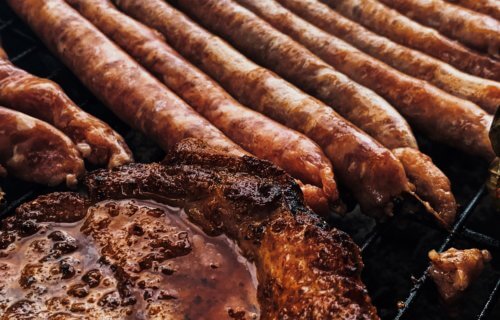DALLAS, Texas —Red meat and processed meats like bacon and sausage can contribute to a person’s risk of having a stroke, scientists warn. A team with the American Heart Association add that eating more vegetable fat or polyunsaturated fat lowered this risk.
Dairy fat in products such as cheese, butter, milk, ice cream, and cream did not have a connection with higher stroke risk. The large scale study found red and processed meat lovers were up to 16 percent more prone to suffer a stroke. Just one serving of processed meats each day increased the risk by 12 percent.
Those who ate the most vegetable fats and polyunsaturated fats – found in fish and nuts – saw their stroke risk drop by 12 percent.
“We recommend for the general public to reduce consumption of red and processed meat, minimize fatty parts of unprocessed meat if consumed, and replace lard or tallow (beef fat) with non-tropical vegetable oils such as olive oil, corn or soybean oils in cooking in order to lower their stroke risk,” says lead author Dr. Fenglei Wang of Harvard’s TH Chan School of Public Health in Boston in a media release.
Can you make cooking red meat healthier?
Researchers also advise removing fatty parts of unprocessed meat and cooking with olive, corn, or soybean oils rather than lard or beef fat. Sizzling steaks and juicy burgers are staples in many Western diets. However, regularly eating red and processed meat can lead to type 2 diabetes, coronary heart disease, and some cancers — particularly in the bowel.
The latest study is the most comprehensive to date, linking stroke risk to vegetable, dairy, and non-dairy animal fats. The results come from an examination of 117,136 health workers in the U.S. who researchers tracked for up to 27 years.
“Our findings indicate the type of fat and different food sources of fat are more important than the total amount of dietary fat in the prevention of cardiovascular disease including stroke,” Dr. Wang adds.
Participants in the top 25 percent of non-dairy animal fat eaters were 16 percent more likely to suffer a stroke than those in the lowest percentile. Specifically, one more serving of processed or red meat a day raised the risk by 12 and eight percent, respectively.
Peers in the top quarter for eating the most vegetable and polyunsaturated fats were 12 percent less susceptible than those in the bottom range. Total red meat included beef, pork, or lamb as a main dish, in sandwiches, or mixed dishes. Processed red meats included foods like bacon, sausages, hot dogs, and cured meats like salami.
Choosing healthy substitutes
During the study, 6,189 participants had strokes. Clots or bleeding blood vessels are a leading cause of ischemic or hemorrhagic strokes, respectively. Dr. Wang says separating saturated fat consumed from vegetable, dairy, or non-dsairy animal sources would be useful in further understanding the association between fat intake and stroke risk.
“Many processed meats are high in salt and saturated fat, and low in vegetable fat. Research shows that replacing processed meat with other protein sources, particularly plant sources, is associated with lower death rates,” says Professor Alice Lichtenstein, a nutritionist at Tufts University.
Prof. Lichtenstein is lead author of the American Heart Association’s Dietary Guidance to Improve Cardiovascular Health.
“Key features of a heart-healthy diet pattern are to balance calorie intake with calorie needs to achieve and maintain a healthy weight, choose whole grains, lean and plant-based protein and a variety of fruits and vegetables; limit salt, sugar, animal fat, processed foods and alcohol; and apply this guidance regardless of where the food is prepared or consumed,” Lichtenstein concludes.
Researchers presented their findings at the American Heart Association’s Scientific Sessions 2021.
South West News Service writer Mark Waghorn contributed to this report.
